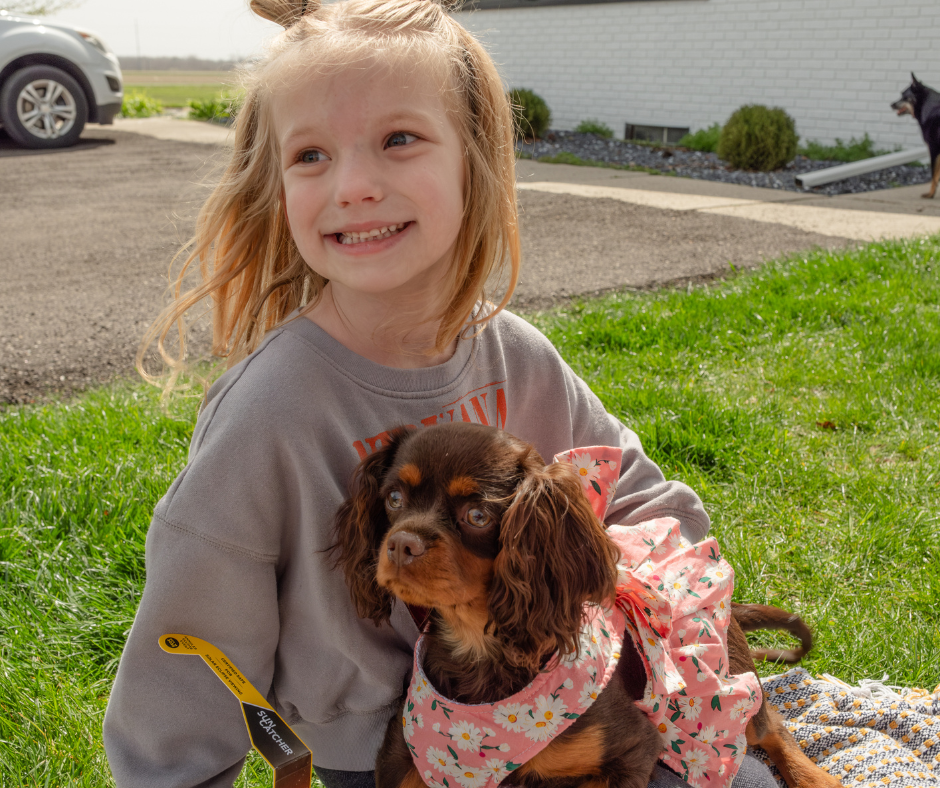When choosing a family dog, it's essential to consider how the breed interacts with children. Cavaliers, or Cavalier King Charles Spaniels, are a popular choice among families for their affectionate and gentle nature. But are they truly good with kids?
Yes, Cavaliers are excellent with kids. Known for their affectionate, gentle, and patient nature, Cavalier King Charles Spaniels are friendly and sociable, making them ideal companions for children. They enjoy playtime and are tolerant of the occasional rough handling by young kids. With proper training and socialization, Cavaliers form strong, positive bonds with children, providing companionship and therapeutic benefits while encouraging responsibility and physical activity.
Overview of the Cavaliers
The Cavalier King Charles Spaniel is a small breed of spaniel that originated in the United Kingdom. Known for their expressive eyes and silky coats, Cavaliers are often described as elegant and charming. They typically weigh between 13 to 18 pounds and stand about 12 to 13 inches tall at the shoulder. Their coat comes in four distinct colors: Blenheim (chestnut and white), Tricolor (black, white, and tan), Ruby (solid red), and Black & Tan.
Cavaliers are part of the toy group, which includes breeds that are generally small and affectionate. They were historically bred as companion dogs for royalty, which has influenced their friendly and sociable nature.
Temperament and Personality of Cavaliers
Cavaliers are renowned for their friendly, affectionate, and gentle temperament. They are often described as "velcro dogs" because they love being close to their human family members. This strong bond and loyalty make them ideal family pets, particularly for households with children.
Their playful and patient demeanor allows them to form strong, positive relationships with kids.
Affectionate and Sociable: Cavaliers thrive on human companionship and enjoy being part of family activities. Their sociable nature makes them excellent playmates for children. They are known to be gentle and tolerant, which is crucial when interacting with young kids who may not always handle pets delicately.
- Playful and Energetic: While Cavaliers are generally laid-back and enjoy lounging around, they also have bursts of energy and love to play. This playful side makes them great companions for children who can engage in interactive play, such as fetch or tug-of-war. Their energy levels match well with kids, providing both entertainment and exercise.
- Patient and Tolerant: Cavaliers are known for their patience, which is essential when dealing with children. They are typically not aggressive and can handle the occasional rough play from toddlers and young children. However, it's still crucial to supervise interactions to ensure the safety of both the dog and the child.
Benefits of Cavaliers for Families with Kids
Companionship: One of the primary reasons families choose Cavaliers is for their companionship. These dogs are incredibly affectionate and form strong bonds with their family members. They are known to follow their owners around the house and seek attention and affection. For children, having a loving and attentive pet can provide a sense of security and friendship.
- Therapeutic Benefits: The gentle and affectionate nature of Cavaliers can have therapeutic benefits for children. Studies have shown that interactions with pets can reduce stress and anxiety levels. For children with special needs, such as autism, the calming presence of a Cavalier can be particularly beneficial.
- Encouraging Responsibility: Having a Cavalier can teach children about responsibility and empathy. Taking care of a pet involves feeding, grooming, and exercising, which can help children develop a sense of duty and compassion. Assigning age-appropriate tasks related to pet care can instill valuable life skills in children.
- Promoting Physical Activity: Cavaliers, with their playful and energetic nature, can encourage children to be more active. Regular playtime and walks with a Cavalier can promote physical activity and outdoor exploration. This can be especially beneficial in an age where sedentary lifestyles are becoming more common among children.
Training and Socialization with Cavaliers
- Training and socialization are crucial for ensuring that Cavaliers are well-behaved and interact positively with children. Here are some essential tips for training and socializing a Cavalier King Charles Spaniel:
- Early Socialization: Expose your Cavalier to various environments, people, and other animals from a young age. This helps them become well-rounded and adaptable. Early socialization can prevent fearfulness and ensure they are comfortable in different situations.
- Basic Obedience Training: Teaching your Cavalier basic commands such as sit, stay, and come is essential for managing their behavior. Positive reinforcement techniques, such as treats and praise, work well with this breed due to their eagerness to please.
- Child Interaction Training: Teach your children how to interact with the dog appropriately. Show them how to gently pet and play with the Cavalier. Supervise interactions, especially with younger children, to prevent accidental rough handling.
- Consistency: Consistency in training is key. Establish a routine and stick to it. Cavaliers respond well to a structured environment where they know what is expected of them.
- Patience and Positive Reinforcement: Cavaliers are sensitive dogs, and harsh training methods can be counterproductive. Use positive reinforcement and be patient. Reward good behavior with treats, affection, and playtime.
Potential Challenges and Considerations When It Comes to Cavaliers
When considering adding a Cavalier King Charles Spaniel to your family, it's important to be aware of potential challenges and considerations associated with this charming breed. While Cavaliers are known for their affectionate and gentle nature, making them wonderful family pets, they also come with specific needs and susceptibilities. Understanding these aspects, from health issues and grooming requirements to behavioral traits, is crucial for ensuring a harmonious and fulfilling relationship with your Cavalier.
- Health Issues: Cavaliers are prone to certain health issues, such as heart problems (mitral valve disease), hip dysplasia, and ear infections. Regular veterinary check-ups and proper care are essential to ensure their well-being. Families should be prepared for potential medical expenses and ongoing care.
- Separation Anxiety: Due to their strong attachment to their families, Cavaliers can suffer from separation anxiety if left alone for long periods. This can lead to destructive behavior and excessive barking. It's important to ensure that the dog has companionship and is not left alone for extended durations.
- Grooming Needs: Cavaliers have a beautiful, silky coat that requires regular grooming. Brushing their coat several times a week is necessary to prevent matting and tangling. Regular ear cleaning and dental care are also important to maintain their overall health.
- Size Considerations: While Cavaliers are generally robust for their size, they are still a small breed. Families with very young children need to be cautious to ensure that the dog is not accidentally injured during play. Teaching children to be gentle and respectful towards the dog is crucial.
- Allergies: Although Cavaliers are not considered hypoallergenic, they tend to produce fewer allergens than some other breeds. However, families with severe allergies should spend time around Cavaliers before committing to ensure that there are no adverse reactions.
Cavalier King Charles Spaniels are widely regarded as one of the best breeds for families with children. Their affectionate, gentle, and sociable nature makes them ideal companions for kids of all ages. With proper training, socialization, and care, Cavaliers can provide endless joy, companionship, and therapeutic benefits to families. However, it's important to consider the potential challenges, such as health issues and separation anxiety, to ensure that both the dog and the family thrive.
When choosing a family dog, it's essential to match the breed's characteristics with the family's lifestyle and needs. Cavaliers, with their loving and adaptable nature, often fit well into family dynamics, providing a source of unconditional love and companionship for children and adults alike. By understanding their needs and ensuring proper training and care, Cavaliers can become beloved members of the family, creating lasting memories and bonds.

